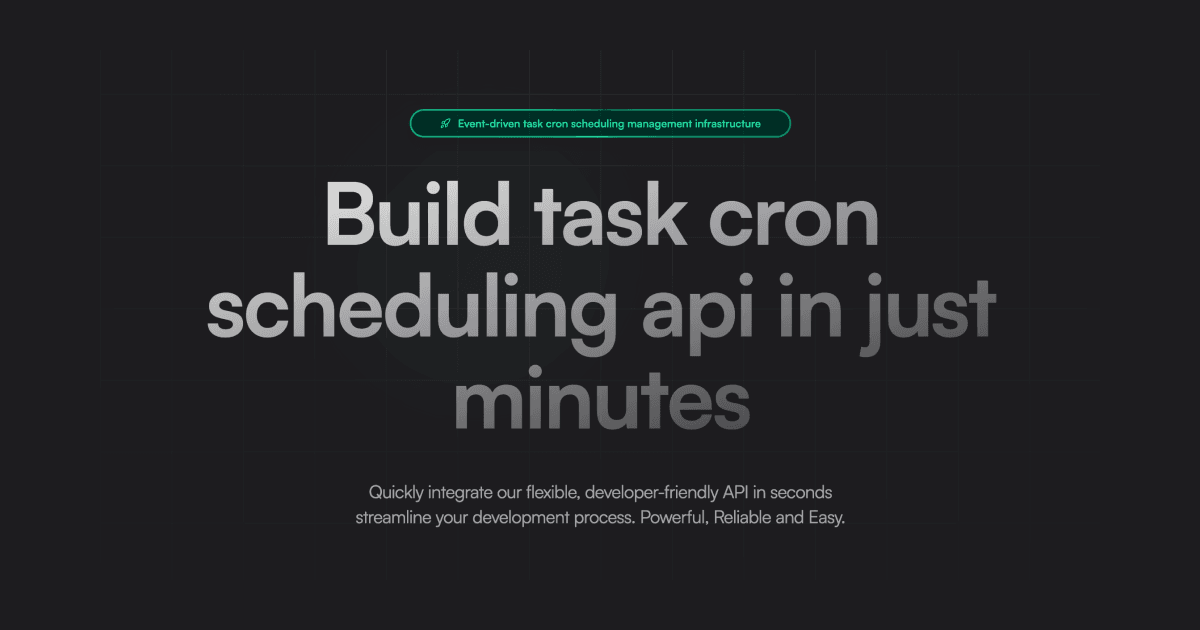What Is Pulsecron and Why You Need It for Your Scheduling Server


In the fast-paced world of modern software development, scheduling plays a crucial role in delivering a seamless user experience. Tasks like sending notifications, processing sign-ups, or executing workflows all rely on precise scheduling solutions. Building a job server or scheduling server from scratch can be a time-consuming and expensive process, which is where Pulsecron excels as an event-based scheduling service. Here’s why choosing Pulsecron will help you streamline your scheduling infrastructure and boost efficiency.
Challenges of Building Job and Scheduling Servers
Building and maintaining a job server or scheduling server internally comes with significant challenges:
- Resource Intensive: Creating and maintaining a job server requires significant development time, configuration, and ongoing maintenance efforts. Engineering teams must often spend weeks or months architecting a solution that can handle the complexities of scheduling. Even after initial deployment, teams will need to dedicate continuous resources to updates, bug fixes, and scaling efforts.
- Scaling Difficulties: Custom-built solutions often struggle with scaling, leading to performance degradation. Managing and orchestrating multiple jobs at scale requires sophisticated infrastructure, which isn't always feasible or available in a custom setup. This limitation often results in sluggish performance, increased latency, and eventually, system failures during peak demand.
- Security Vulnerabilities: Ensuring robust security protocols is essential yet complex. Internal job servers need comprehensive security measures to safeguard sensitive data from unauthorized access. However, maintaining up-to-date security measures requires a high level of expertise and dedicated effort that in-house teams often lack.
- Monitoring Gaps: Tracking performance metrics requires specialized monitoring tools that may not be available. Teams need to ensure tasks execute at precise times and to identify potential issues before they cause critical delays or failures. Without proper observability, gaining insights into job performance becomes an uphill struggle.
How Pulsecron Solves These Challenges
Pulsecron is designed to address these pain points with an optimized event-based scheduling solution.
-
Effortless Setup and Integration Pulsecron features a user-friendly API that makes integrating it into your existing systems straightforward. This effortless setup means you can quickly connect Pulsecron to your application without overhauling your entire architecture. It ensures smooth and fast deployment, enabling you to get up and running with scheduling features in a fraction of the time it would take to build them internally.
-
Cost-Efficient Management Managing your own job server can be costly due to infrastructure overheads and developer time. Pulsecron minimizes these costs by offering a fully managed solution that reduces the need for complex internal setups and expensive infrastructure investments. Developers can focus on building valuable product features instead of managing the intricate details of a scheduling server.
-
Logical Separation and Task Scalability Pulsecron facilitates logical separation between event initiation and processing through webhooks. By decoupling these two parts, businesses can ensure smooth workflows without interrupting other critical processes. Whether you're processing thousands of tasks per minute or only need occasional notifications, Pulsecron’s scalable infrastructure can handle growing task volumes effortlessly, ensuring reliable performance for all.
-
Security and Reliability at Scale Security is crucial in any scheduling service. Pulsecron employs advanced security protocols to ensure that all data remains protected and reliable during event handling. All communications between your application and Pulsecron are encrypted to safeguard your data from unauthorized access. Its scalable infrastructure also ensures consistent performance and uptime even under high demand, reducing the risks of downtime.
-
Comprehensive Monitoring and Reporting Pulsecron provides a comprehensive dashboard for tracking performance metrics and scheduling status. Businesses gain valuable insights into which tasks are running as expected and which ones need attention. These insights allow them to optimize their operations efficiently, reducing latency and errors. Continuous monitoring helps you identify and resolve issues quickly, minimizing downtime.
-
Global Time Zone Support Pulsecron supports accurate execution and automatically adjusts tasks for global time zones and regulatory requirements. This ensures relevance and timeliness, particularly for businesses operating across regions. By eliminating manual timezone calculations, Pulsecron ensures that notifications, workflows, and tasks always happen when they should.
Why Pulsecron Is Ideal for Your Scheduling Server Needs
Pulsecron is purpose-built to solve the challenges of creating and managing a job server or scheduling server. Its event-based scheduling system combines ease of use, cost efficiency, scalability, security, and global relevance to deliver a robust solution that caters to your growing needs. Whether you’re managing periodic tasks or processing workflows triggered by user actions, Pulsecron is the answer to seamless scheduling infrastructure.
Are you ready to transform your scheduling with Pulsecron? Simplify your job server development today and give your teams the tools they need to build reliable workflows efficiently.
👉 Learn more about Pulsecron's event-based scheduling solutions


